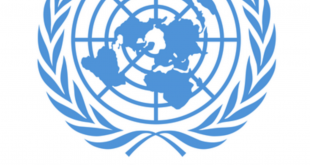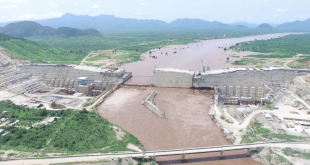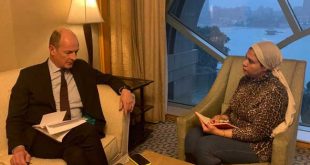Alaa Thabet – Ahram Online
In an interview with Al-Ahram Chief Editor during his brief visit to Cairo, Maeen Abdulmalik affirmed that his government will always support peace efforts and will never stand in the way of peaceful solutions.
Yemen’s Prime Minister, Maeen Abdulmalik, called upon the international community to exercise the maximum pressure, including sanctions, against the Houthi militias.
The militias, according to him, “have become a serious threat not only to Yemen but to the whole region as well as international trade and marine routes”.
However, he believes that “the current changes of superpower policies in the Middle East will not be reflected in Yemen, which is currently heading towards a humanitarian crisis”.
“The Houthis have been intransigent and rejected all peace efforts and concessions forwarded by the Yemeni government. The Gulf Initiative, National Dialogue Conference and UN Security Council Resolution 2216, should form a solid base for any serious efforts to end the dilemma in Yemen”, he added.
“The Saudi initiative was part of the kingdom’s efforts to end the fighting in Yemen. The government was willing to open Sana airport, pay the delayed wages of the government employees in the areas controlled by the Houthis, but the latter rejected the government steps to build trust. We are not dealing with a political power (Houthis) but rather with radical, racist militias that have been terrorizing Yemenis and have never believed in peace”, the Yemeni premier explained.
On the other hand, the US has assigned a special envoy to Yemen which meant for some, the new administration was interested in settling the Yemeni issue. Despite the serious efforts exerted by the Yemeni government to seriously deal with the new US administration, the American efforts have stagnated because of the Houthis’ misreading of international initiatives and lack of serious pressures exercised against them.
“There were no serious effort to disturb their channels of funding or means of getting weapons to put an end to the ongoing threats in one of the most fragile marine routes in the strait of Bab Al-Mandab. The strait is a sea route chokepoint between the Horn of Africa and the Middle East, connecting the Red Sea to the Gulf of Aden and Arabian Sea. Most exports of petroleum and natural gas from the Persian Gulf that transit the Suez Canal or the SUMED pipeline pass through both the Bab Al-Mandab and the Strait of Hormuz”.
The current changes in big powers’ policies in the Middle East will not be echoed in Yemen. According to the PM, “the superpowers are only looking after their interests in this region and we should develop our own strategy to secure a better future for our people”.
The escalation of terror acts by the Houthis in Yemen was cited by the PM as a sign of the militia’s role in the region. Maeen Abdulmalik said, “the Houthis are part of the Iranian project and have been used as a proxy by the Iranians in the nuclear negotiation with the United States. Thus, they have been advancing their efforts to upset the security situation in Yemen. The militias have been targeting civilians and international employees, committing massacres in Mareb, besieging Abdia as well as Taiz, in addition to targeting the Mocha commercial port”, the premier said.
The war in Maareb has been intensified by the Houthis where thousands of fighters have been moved to the area for the past eight months seeking a moral or battlefield victory to no avail. “We will be defending the city with all our economic, military and diplomatic resources with the help and support of the local tribes and the Yemeni people there”.
“For the past seven years, the Houthis have been terrorising Yemenis and casting off any peace efforts to reach a settlement leading the country to the current human crisis. Meantime, there has been no international pressure despite the war crimes committed and the collective execution of politicians and journalists. So how would anyone expect them to work for peace”, Maeen Abdulmalik said.
“There is only one party sitting at the peace table for negotiation, offering concessions and peaceful solutions, but the other party is still absent, busy attacking Yemeni cities with all sorts of weapons. Unfortunately, no one has exerted enough efforts to bring them to the negotiating table. It takes two to tango”, he added.
Commenting on the current affairs in Yemen, Abdulmalik said, “the country is going through a very difficult phase. Yemenis have been challenged by economic, security and human crises as an expected outcome of years of complicated war initiated by the Houthis militias”. The government, as he said, cannot afford to settle such challenges single handed. “There is a need for all Yemenis to collectively work to secure a peaceful path to the future. There should be serious efforts to move forward and execute the Riyadh agreement to regain the country’s sovereignty and harness efforts to defeat the Iranian project in Yemen.”
“The Houthis have been systematically working hard to make the cost of war unaffordable to Yemenis”, Abdulmalik said. The local currency has been steadily falling behind, thus adding increasing pressures to the economy. The government has been working on a comprehensive economic package to activate better monetary tools, rationalize spending and boost revenues, in addition to fighting corruption. However, there is an urgent need for international support to enhance the government’s efforts and save Yemenis from a developing human crisis. “Yemen is heading towards a humanitarian crisis which could hardly be alleviated unless the economic situation is settled and part of the human assistance is directed to economic development and job creation,” he added.
The government in Yemen has been working to avoid reaching the point of no return as far as the economic situation is concerned. Monetary and economic reform were tools to mitigate the current humanitarian crisis. Meanwhile, international pledges to fund the United Nations humanitarian response plan were not up to Yemen’s aspirations. So far, less than half of the $3.85 Billion pledged has reached Yemen. The funding gap lags behind the current humanitarian crisis, therefore, part of the fund should be used to support the government economic plan.
According to Abdulmalik, the COVID-19 pandemic was one of the most challenging factors to the Yemeni government. The health sector was already collapsing; most hospitals were closed as well as health centres. Yet with the help and support of our international partners, the government worked hard to secure an emergency plan and took several preventive and precautionary measures that helped contain the expected disastrous consequences of the pandemic.
The prime minister’s visit to Egypt, as he said, “came at a time when the Arab world is looking to Cairo as the cornerstone of security in the region. Egypt has security interests in the Red Sea, especially at the strait of Bab Al-Mandab; as one of the most important commercial marine routes in the region. Abdulmalik pointed to “the fact that the long history between Egypt and Yemen goes back to 1962 revolution when Cairo supported the Yemeni’s aspiration for independence and progress”.
Currently, Egypt has affirmed the unity of Yemen and rejected Iranian interference in the region.






